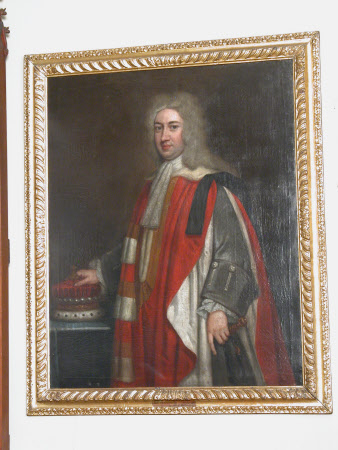Sir John Brownlow, 5th Bt, later 1st Viscount Tyrconnel (c.1692-1754)
Sir Godfrey Kneller (Lübeck 1646 - London 1723)
Category
Art / Oil paintings
Date
1720 (signed and dated)
Materials
Oil on canvas
Measurements
1257 x 1003 mm (49 1/2 x 39 1/2 in)
Place of origin
England
Order this imageCollection
Erddig, Wrexham
NT 1151323
Summary
Oil painting on canvas, Sir John Brownlow, 5th Bt, later 1st Viscount Tyrconnel (c.1692-1754) by Sir Godfrey Kneller (Lübeck 1646 - London 1723), signed and dated: lower right: G. Kneller [GK in ligature] /f.1720. A three-quarter length portrait of the uncle of Elizabeth Cust, Mrs Philip Yorke I, wearing peer's robes, his right hand resting on his coronet on a table. He was the son of Sir William Brownlow (1665-1702) and Dorothy Mason (1655?-99/1700). He married, firstly Eleanor Brownlow (1691-1730) and, secondly, Elizabeth Cartwright (d.1780). He was created Viscount Tyrconnel and Baron Charleville in 1718 and made Knight of the Order of the Bath in 1725. The gilt must have been taken off the gingerbread by his having to receive the Order of the Bath as an Irish peer, one day after the other recipients. In 1730 after Eleanor's death he wooed the indefatigable letter-writer Mrs Delany who felt that even though 'he had so vast a fortune, a title and was a very good natured man ...money without worth could not tempt her' 'He had the chracter, very justly of being silly, and I would not tie myself to such a companion for an empire'. Sir John was possessed of a driving ambition, but few political skills, and had an inordinately high opinion of his own importance, (an opinion not shared by his family, his colleagues or his peers). His pretensions and his faliure to achieve high office have tended to obscure a more positive side to his character - what one contemporary described as 'his nice taste and his well chosen knowledge' of the arts. It was this nice taste and well-chosen knowledge which were his greatest legacy to Belton. As an Irish peer he was still able to sit in the Commons and he continued to represent Grantham until his retirement in 1741. On the death of his wife's mother Alice Sherard, Lady Brownlow (1659-1721) Belton passed to him and became his main residence. He and his wife patronised the arts and he began to collect Old Masters and adapt Belton to their own taste. However he died without issue and his estates and half his possessions passed to his sister Anne Brownlow, Lady Cust (1694-1779) who instantly moved her family into Belton (NT).
Provenance
In early undated 19th century inventory of Erddig, as: "Ld: Tyrconnel - Kneller" and thence by descent; given by Philip Yorke III (1905 – 1978) along with the estate, house and contents to the National Trust in 1973
Credit line
Erddig, The Yorke Collection (National Trust)
Marks and inscriptions
Recto: G. Kneller [GK in ligature] / f.1720 (signed and dated) Recto: 19thC paper label stuck beneath frame: LORD TYRCONNEL. Circiter 1688/by Sir G. Kneller
Makers and roles
Sir Godfrey Kneller (Lübeck 1646 - London 1723), artist
References
Erddig 1800-29 Inventory of contents of Erddig, 1800-1829, "Ld: Tyrconnel - Kneller" Steegman 1957 John Steegman, A Survey of Portraits in Welsh Houses, Vol.I: North Wales, Cardiff, 1957, p.95. "PORTRAITS AT ERDDIG, WREXHAM. 8. JOHN BROWNLOW, 1ST VISCOUNT TYRCONNEL and 5th Bt., K.B., c.1692-1754. Anon. c.1730-35. 50 x 40. TQL., seated, wearing peer's robes over grey suit; a viscount's coronet on table at l. His sister m. Sir Richard Cust, 2nd Bt., and was mother of Sir John Cust 3rd Bt. (see no.11)." Stewart 1983 J. Douglas Stewart, Sir Godfrey Kneller, Oxford, 1983, no. 773A, p.135.

